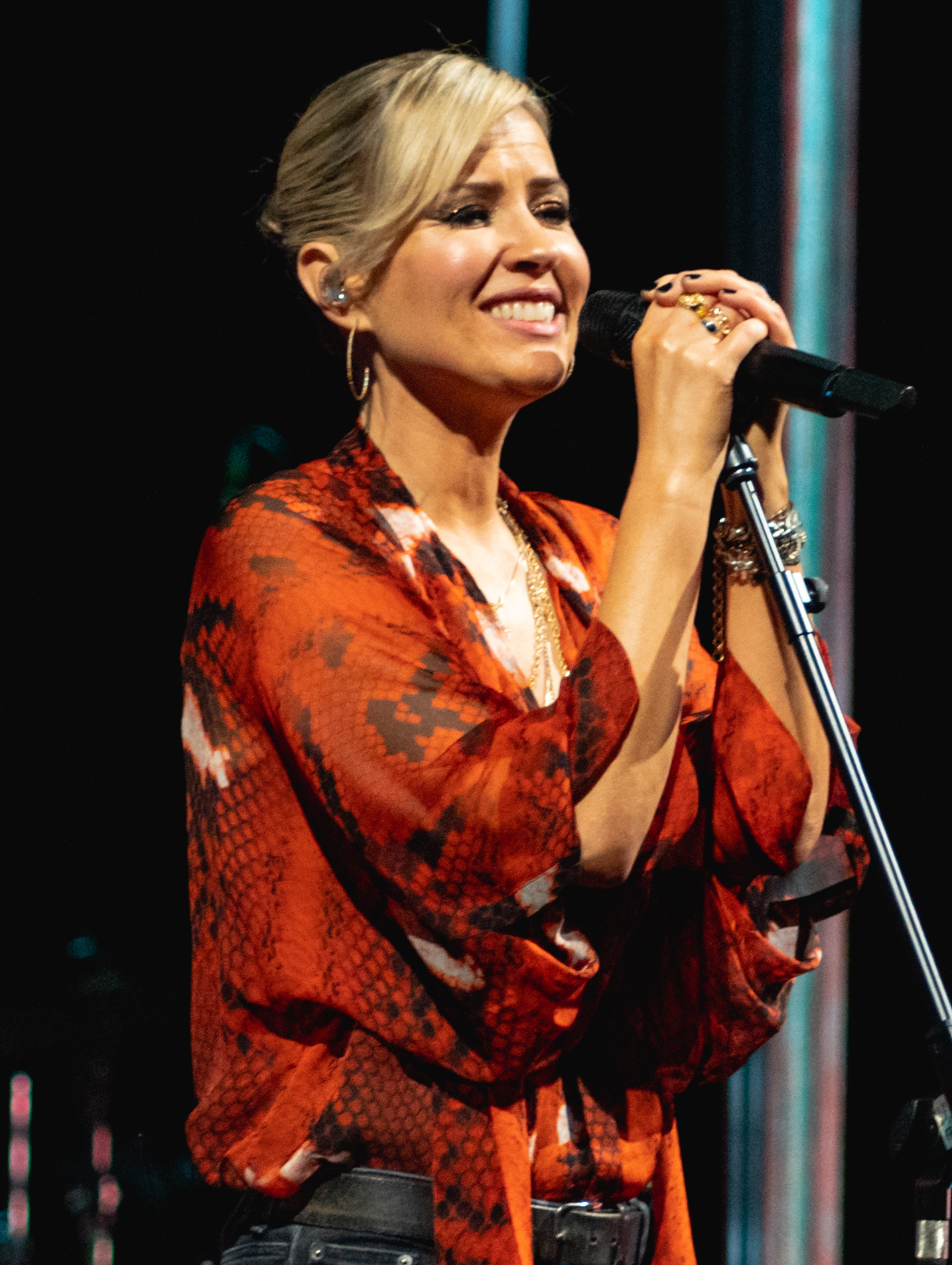Dido: Ethereal Vocals and Enduring Musical Legacy
Dido Armstrong has established herself as one of the most distinctive voices in contemporary popular music, seamlessly blending electronic, folk, and pop sensibilities into a sound that feels both intimate and expansive. At 52, the British singer-songwriter has achieved a rare balance between commercial success and artistic credibility, selling over 40 million albums worldwide while maintaining a reputation for authenticity and emotional depth throughout her career.
Early Years and Musical Foundations
Born Florian Cloud de Bounevialle O’Malley Armstrong on December 25, 1971, in Kensington, London, Dido grew up in a household where creativity was both valued and nurtured. Her father, William O’Malley Armstrong, was a publisher and former managing director at a publishing house, while her mother, Clare, was a poet. This literary environment influenced Dido’s later approach to songwriting, with its emphasis on narrative clarity and emotional precision.
From an early age, Dido demonstrated remarkable musical aptitude, beginning formal training on piano at age six and adding violin to her studies shortly thereafter. Her classical education continued at London’s prestigious Guildhall School of Music and Drama, where she developed the technical foundation that would later underpin her seemingly effortless vocal performances.
“The classical training gave me a vocabulary I wouldn’t otherwise have had,” Dido explained in a rare in-depth interview. “Even when I’m making music that sounds simple, there are layers of understanding about structure and harmony that come from those early years of formal study.”
Despite this rigorous musical education, colleagues from this period recall that Dido always maintained an openness to diverse musical influences beyond the classical realm. This curiosity about different genres and sounds would later become a hallmark of her recording career.
Early Professional Experience and Faithless
While many know Dido only through her solo work, her professional music career actually began as a backing vocalist and co-writer with the electronic music collective Faithless, fronted by her brother Rollo Armstrong. This experience proved formative, exposing her to studio techniques and electronic production methods that would later influence her solo material’s distinctive sonic character.
Faithless achieved significant success in the late 1990s dance music scene, particularly with tracks like “Insomnia” and “God Is a DJ.” Throughout this period, Dido contributed vocals to the group’s recordings and occasionally performed live with them, gaining valuable industry experience while developing her own artistic voice away from the spotlight.
“Working with Faithless was like an apprenticeship in modern music production,” noted a producer who worked with the group. “Dido was absorbing everything—how tracks were built, how electronic and organic elements could be balanced, how to create emotional resonance within dance music frameworks. You can hear all of that knowledge in her solo work.”
This background in electronic music helped distinguish Dido from other singer-songwriters of her era. While many of her contemporaries worked primarily within acoustic or conventional pop frameworks, her comfort with electronic textures allowed her to create a signature sound that felt simultaneously warm and otherworldly.
Solo Breakthrough and International Success
Dido’s debut album, “No Angel,” was initially released in 1999 with modest promotional support and achieved respectable but not exceptional sales in its first year. The album’s fortunes changed dramatically in 2000 when American rapper Eminem sampled her track “Thank You” for his hit single “Stan,” exposing Dido’s music to a massive new audience.
This unexpected cross-genre exposure catalyzed extraordinary interest in “No Angel,” which was subsequently re-promoted and went on to sell over 21 million copies worldwide—making it one of the best-selling albums of the 2000s. Audience response was particularly strong to singles like “Here With Me,” “Thank You,” and “Hunter,” which showcased Dido’s ethereal vocals and emotionally direct lyrics.
Music industry analysts have noted the unique commercial trajectory of “No Angel,” which differed significantly from typical pattern of immediate success followed by declining interest. “Dido’s debut had this remarkable slow-burn quality,” observed a former label executive. “Rather than frontloading all its success, it kept finding new audiences over several years, which is extraordinarily rare in the singles-driven market of that era.”
The success of “No Angel” established Dido as a major commercial force, but also created significant expectations for her follow-up release. Rather than rushing new material to capitalize on her newfound fame, she took a deliberate approach to her sophomore album, working to ensure it maintained the emotional authenticity that had connected so strongly with listeners.
Artistic Consolidation and Continued Success
When “Life for Rent” arrived in 2003, it confirmed Dido’s status as more than a one-album phenomenon. Led by the emotionally complex single “White Flag,” the album sold over 12 million copies worldwide and received strong critical response for expanding her sonic palette while maintaining the intimate quality that had defined her debut.
“‘Life for Rent’ demonstrated Dido’s rare ability to create music that functions equally well as background atmosphere and as foreground emotional statement,” wrote a prominent music critic. “The songs reward both casual and close listening—working as elegant mood pieces but revealing deeper layers of meaning with repeated engagement.”
This period represented the commercial apex of Dido’s career, with massive world tours and high-profile television appearances. Throughout this intense exposure, colleagues noted her ability to maintain a grounded perspective uncommon among artists experiencing such sudden fame.
“Even when she was literally one of the biggest-selling artists in the world, Dido maintained this remarkable normalcy,” recalled a touring musician who worked with her during this period. “There was never any of the diva behavior you often see at that level of success. She seemed genuinely surprised by the scale of her audience and focused on the music rather than the celebrity.”
This disinterest in the trappings of fame would become increasingly evident in her subsequent career choices, as Dido began to shape a professional path prioritizing artistic satisfaction and personal balance over commercial imperatives.
Artistic Evolution and Career Autonomy
Following the massive commercial success of her first two albums, Dido made a series of decisions that emphasized creative integrity over market expectations. Her third album, “Safe Trip Home” (2008), represented a more experimental approach, incorporating jazz influences and more complex arrangements while exploring themes of loss and mortality following her father’s death.
Though less commercially dominant than her previous work, “Safe Trip Home” earned strong critical acclaim, with reviewers particularly noting its musical sophistication and emotional depth. This pattern—of prioritizing artistic evolution over commercial formula—would continue with 2013’s “Girl Who Got Away” and 2019’s “Still on My Mind,” each project reflecting Dido’s changing perspectives while maintaining her distinctive vocal approach.
“What’s remarkable about Dido’s career arc is how she’s navigated the transition from commercial juggernaut to respected artistic figure,” noted a music industry analyst. “Many artists who achieve that level of mainstream success struggle to maintain relevance when sales inevitably decline, but she’s managed to build a sustainable career based on musical quality rather than commercial metrics.”
This transition was made possible in part by Dido’s financial success during her peak commercial years, which provided the freedom to approach subsequent projects with greater independence. Unlike many artists who feel pressure to maintain constant visibility, she has taken significant breaks between album cycles, allowing for personal growth that informs her creative output.
Personal Life and Artistic Perspective
Dido’s approach to public life has been characterized by a level of privacy uncommon among artists of her commercial stature. While never secretive, she has consistently maintained boundaries between her professional and personal spheres, limiting media exposure to promotion of her musical projects rather than her private life.
This approach became even more pronounced following her 2010 marriage to writer Rohan Gavin, son of children’s author Jamila Gavin, and the birth of their son in 2011. Friends describe Dido’s transition to parenthood as transformative but note that she approached it with the same grounded perspective that has characterized her music career.
“Becoming a mother gave Dido new emotional territory to explore in her writing,” explained a longtime colleague. “You can hear it in her later work—there’s a different kind of depth that comes from that experience. But she’s also been very protective of her family’s privacy, keeping that part of her life separate from her public persona.”
This commitment to maintaining normal family life despite her fame aligns with Dido’s generally understated approach to celebrity. Unlike many contemporary artists who use social media and personal brand extension to maintain visibility between projects, she has focused primarily on musical output, engaging with public attention mainly when releasing new material.
“Dido has always seemed most comfortable letting her music speak for itself,” observed a former label marketing executive. “There’s no separation between her authentic self and her artistic expression—what you hear in the music is genuinely who she is, without the layers of persona that many artists construct.”
Vocal Style and Sonic Signature
Perhaps the most immediately recognizable aspect of Dido’s artistry is her distinctive vocal approach, which combines technical precision with emotional vulnerability in a way that few contemporary singers achieve. Music educators have noted her excellent breath control and pitch accuracy, which allow for her characteristic delicate delivery without sacrificing clarity or expression.
“What makes Dido’s voice so special is this combination of technical skill and emotional openness,” explained a vocal coach who has studied her technique. “She never oversings or relies on vocal gymnastics, but there’s remarkable control in how she modulates between chest voice and head voice, creating that ethereal quality while maintaining perfect intonation.”
This vocal approach is complemented by production choices that typically feature electronic elements balanced with acoustic instrumentation—creating sonic environments that feel both intimate and expansive. Even on her most commercially successful tracks, there’s a sense of space and restraint that allows her voice to remain the central focus.
Lyrically, Dido’s writing has maintained a consistent emotional directness while evolving in thematic complexity throughout her career. Early successes like “Thank You” and “White Flag” demonstrated her ability to distill complex emotional situations into accessible narratives, while later work has explored more nuanced territory including parental love, aging, and existential questioning.
Cultural Impact and Musical Legacy
As her career has progressed, cultural commentators have increasingly recognized Dido’s significant influence on popular music, particularly in how she helped legitimize the integration of electronic elements in singer-songwriter contexts. Many subsequent artists who blend programming with traditional songcraft acknowledge her pioneering approach to this synthesis.
“Dido arrived at a moment when electronic music and traditional songwriting were often seen as separate worlds,” noted a music historian. “Her work demonstrated how seamlessly they could be integrated, creating a template that countless artists have since followed. That influence extends far beyond artists who sound specifically like her.”
Her commercial impact has been equally significant, with “No Angel” helping to define the adult-oriented pop landscape of the early 2000s. Industry analysts note that her success opened doors for similarly sophisticated pop artists who might previously have been considered too subtle for mainstream success.
Perhaps most remarkably, Dido’s music has maintained its cultural relevance despite the artist’s limited interest in celebrity maintenance. Streaming statistics reveal that her catalog continues to attract significant new listeners, with younger audiences discovering her work through playlists and algorithm recommendations rather than traditional promotion.
Current Activity and Future Prospects
Following the release of “Still on My Mind” in 2019 and the subsequent tour (her first in 15 years), Dido has continued her pattern of selective professional engagement, choosing quality over quantity in both recording and performance contexts. Recent interviews suggest she continues to create new material at her own pace, unbound by conventional album cycle expectations.
“I’ve reached a place where I make music because I love the process, not because of external schedules or pressure,” she explained in a recent interview. “That freedom has made creating music joyful again—it’s about expression rather than fulfilling market demands.”
Music industry observers note that this approach has positioned Dido for long-term career sustainability in an era when many of her contemporaries struggle with the changed economics of the streaming landscape. By cultivating a dedicated audience that values quality over novelty, she has created a model of artistic longevity that prioritizes creative satisfaction over commercial metrics.
“Dido represents a different kind of pop career trajectory,” explained a music business professor. “Rather than burning brightly and briefly, she’s demonstrated how artists can transition from massive commercial peaks to sustainable artistic practices that might be less visible but are ultimately more rewarding.”
As streaming platforms continue to reshape how music is consumed, Dido’s catalog has demonstrated remarkable resilience, with signature tracks like “Thank You,” “White Flag,” and “Here With Me” maintaining cultural relevance decades after their initial release. This endurance speaks to the timeless quality of her songwriting and the emotional authenticity that has characterized her work from the beginning.
In an industry often defined by constant reinvention and novelty, Dido has carved out a singular path defined by musical consistency, emotional honesty, and personal authenticity. As she continues to create on her own terms, her legacy stands as a testament to the enduring power of understated artistry and the possibility of maintaining creative integrity even at the highest levels of commercial success.








